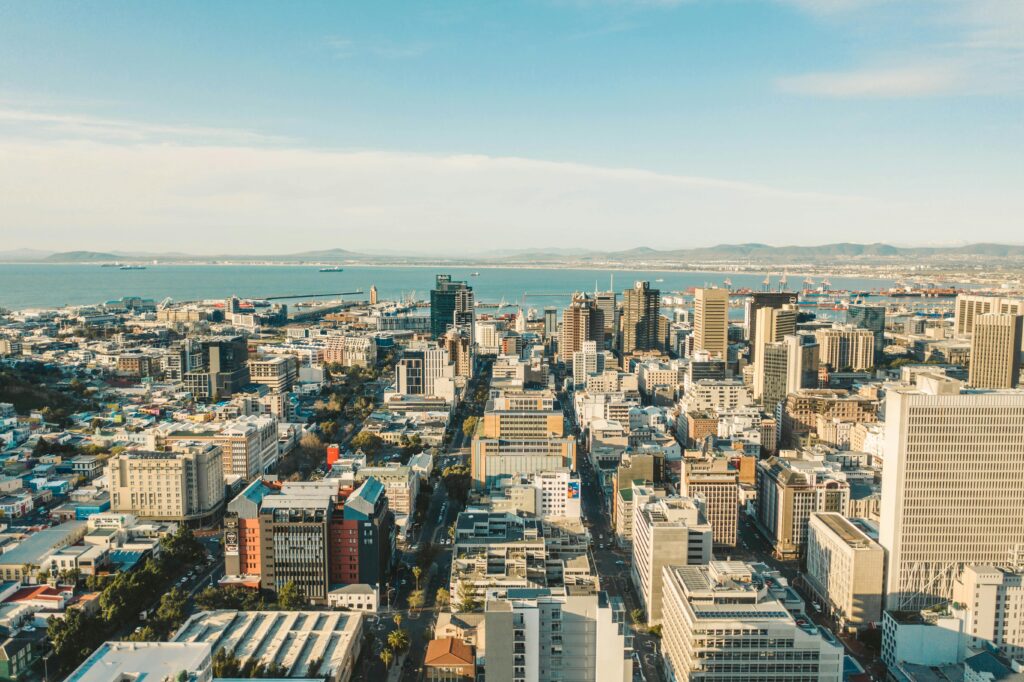Cape Town Real Estate: A Market Overview
8/25/2025

South Africa has always been a land of contrasts—vast natural beauty paired with complex social dynamics, sophisticated financial infrastructure operating alongside developmental challenges. With a population of roughly 62 million people, it is the continent’s second-largest economy, home to deep capital markets, strong banks, and one of the most liquid housing finance systems in Africa.
For real estate investors, this means two things. First, there is access to mortgage funding through established banks, with loans priced off the prime lending rate (currently 10.5%). Second, the broader market environment remains fragile: national house prices grew just 2.2% year-on-year in April 2025, and when adjusted for inflation, values are actually slipping in real terms.
Western Cape: A Political and Economic Outlier
Zooming in, the Western Cape stands apart from the rest of the country. With 7.4 million residents, it is governed by the Democratic Alliance (DA), not the ruling African National Congress (ANC). The DA’s governance model—often praised for fiscal discipline, service delivery, and relatively low levels of corruption—has made the province a magnet for “semigration”: middle-class families and professionals relocating from Gauteng, KwaZulu-Natal, and the Free State.
The result is a property market that has outperformed. While Gauteng has struggled to grow, Western Cape prices rose around 8.7% year-on-year into 2025. Cape Town is the beating heart of this success.
Cape Town: Africa’s Most Liveable City
Cape Town, with its 4.8 million residents, is consistently ranked as Africa’s most liveable city. It offers a rare combination: a stunning natural environment (Table Mountain, Clifton beaches, the Cape Winelands), strong infrastructure, and cosmopolitan culture. Cape Town International Airport has repeatedly been rated Africa’s best airport, and the city’s hospitality sector is enjoying a rebound with nearly one million international visitors in Q1 2025.
This mix of natural beauty, governance stability, and global connectivity underpins the real estate story.

Breaking Down the Residential Submarkets
The city is not a single market—it is a tapestry of micro-markets, each with its own price points and investment logic.
- Atlantic Seaboard (Clifton, Camps Bay, Sea Point, Llandudno): Cape Town’s most prestigious strip. Clifton and Llandudno command R20–30 million minimum buy-ins for villas, with limited stock and strong international demand. Camps Bay blends luxury villas (R10m+) with an Airbnb-driven rental economy. Sea Point and Green Point are the densest apartment markets, where one-bedroom flats start from R2.5m and generate gross yields of 8–10%.
- City Bowl (Gardens, Tamboerskloof, Vredehoek): Young professionals and tourists dominate. Entry points at R2m–3m, with some of the city’s strongest yields (10–11% gross).
- Southern Suburbs (Newlands, Rondebosch, Observatory, Woodstock): Known for schools and the University of Cape Town. Newlands and Rondebosch command family-home premiums (R5–10m). Observatory and Woodstock offer redevelopment opportunities at R1.5–2.5m.
- Southern Peninsula (Hout Bay, Noordhoek, Scarborough): Scenic, semi-rural, popular for retirement and lifestyle buyers. Villas in Hout Bay start from R4m; Scarborough and Noordhoek from R3m.
- Western Seaboard (Blouberg, Table View): Value segment, apartments from R1.2m–1.8m. Known for kite surfing, remote work, and STRs with high seasonality.
Commercial Property Landscape
Cape Town’s commercial market is equally diverse. The CBD and Foreshore remain central for corporate and government tenants but suffer higher vacancies. Decentralised nodes—Claremont, Century City, Black River Park (Observatory), Tygervalley—perform strongly, with sub-10% vacancy rates. Industrial property is another standout: Montague Gardens, Epping, Somerset West, Airport Industria are among South Africa’s tightest logistics markets, with very low vacancy and consistent rental growth. Retail, led by hubs like the V&A Waterfront and Canal Walk, has stabilised and is performing above national averages.
Considerations for Every Investor
Whether you are buying an apartment, a seaside villa, a guesthouse, or a logistics park, the same key questions apply.
1. What is the sociopolitical outlook?
How could future elections or economic shifts influence tourism flows, consumer demand, and property financing costs?
2. What zoning applies to my property?
Is the site zoned for residential, commercial, mixed-use, or tourist accommodation? Do heritage protections limit redevelopment or façade changes?
3. Which investment structure should I use?
Should the asset be held personally, through a company, a trust, or a fund vehicle? How does this impact financing, liability, and exit flexibility?
4. How will I manage the property?
For apartments, do I need a rental agent? For hotels, guesthouses, or offices, do I have a management company or operator in place to ensure stable cash flow?
5. What are the tax implications?
What duties, income taxes, or withholding taxes apply to rental and hospitality income? How will capital gains or VAT affect a future sale?
6. How will this affect my lifestyle or corporate strategy?
Am I investing purely for yield, or also for personal use, brand positioning, or as a strategic foothold in Africa?
7. Which submarket best fits my goals?
Am I seeking high-yield short-term rentals in Sea Point, stable family rentals in Newlands, lifestyle retreats in Noordhoek, hotel opportunities in the City Bowl, or logistics assets in Montague Gardens and Somerset West?
8. What is the outlook of the submarket I am planning to invest in?
Is demand rising or stabilising? Are yields compressing, or is rental growth accelerating? How resilient is this node to shifts in tourism, migration, or office demand?